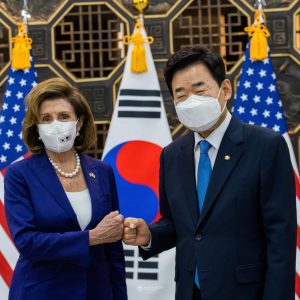North Korean Foreign Ministry released a statement on Saturday criticizing U.S. House Speaker Nancy Pelosi’s visit to South Korea.
“As reported, Pelosi, speaker of the House of Representatives of the U.S., who had come under a volley of due criticism from China for destroying regional peace and stability by visiting Taiwan, stirred up the atmosphere of confrontation with the DPRK during her visit to south Korea,” said Jo Yong Sam, director general of the Department of Press and Information of North Korea’s Foreign Ministry, in the statement released by the state-controlled media KCNA.
DPRK is the acronym for North Korea’s official name: Democratic People’s Republic of Korea.
After her much-discussed visit to Taiwan, Pelosi visited Seoul and had a meeting with her counterpart Kim Jin-pyo, the speaker of the National Assembly, on Thursday. They both agreed to support Washington and Seoul’s efforts to achieve denuclearization and peace on the Korean Peninsula under strong deterrence against North Korea.
“She, with the south Korean authorities, talked about ‘strong and expanded deterrent’ for coping with ‘threat from north Korea’ and made her appearance even in the joint security area of Panmunjom, utterly betraying the vision of the hostile policy of the current U.S. administration towards the DPRK,” Jo said.
“Lurking behind it is the sinister scheme of the U.S. to further escalate the already-tense situation in the Korean peninsula and the region by pushing the current ruling south Korean conservative forces into confrontation with the fellow countrymen in the north, and to use it as an excuse for justifying its anachronistic hostile policy toward the DPRK and reckless arms buildup.”
Tensions on the Korean Peninsula have been escalated by the North’s flurry of missile testing this year. Thus far in 2022, North Korea has tested intercontinental ballistic missiles (ICBMs), suspected hypersonic missiles, submarine-launched ballistic missiles, and a “new-type tactical guided weapon.”
Washington and Seoul have repeatedly urged Pyongyang to come back to the negotiating table with no preconditions. However, since North Korean leader Kim Jong Un failed to entice former U.S. President Donald Trump to lift the devastating economic sanctions against the country at the Hanoi summit in 2019, Pyongyang has not responded to their gestures for dialogue. Instead, North Korea has responded with harsh rhetoric to moves by the U.S. and South Korea to bolter deterrence.
In condemning Pelosi’s visit to Ukraine in April and her trip to Taiwan last week, Jo called her “the worst destroyer of international peace and stability” and warned that “it would be a fatal mistake for her to think that she can go scot-free in the Korean peninsula.”
Jo’s statement came three days after the spokesperson of the North’s Foreign Ministry released a statement criticizing Pelosi’s trip to Taiwan on Wednesday.
“We vehemently denounce any external force’s interference in the issue of Taiwan, and fully support the Chinese government’s just stand to resolutely defend the sovereignty of the country and territorial integrity,” the spokesperson said.
While reiterating its stance on the “One China” principle, the spokesperson also said “the impudent interference of the U.S. in internal affairs of other countries and its intentional political and military provocations are, indeed, the root cause of harassed peace and security in the region.”
During the meetings hosted by the ASEAN Regional Forum last week, South Korean Foreign Minister Park Jin reiterated his government’s “audacious plan” to support reviving North Korea’s economy should Pyongyang takes substantive steps toward the denuclearization. Park also urged North Korea to return to the negotiating table with no preconditions. However, Ahn Kwang Il, North Korea’s ambassador to Indonesia, said conditions should be made first for restoring dialogue, demonstrating Pyongyang’s clear stance over the nuclear talks.
Park will be having a ministerial meeting with the Chinese Foreign Minister Wang Yi this week in Qingdao, China. During the talks, the ministers will likely discuss Pyongyang’s possible provocations against South Korea-U.S. joint military drills that are scheduled later this month.

































